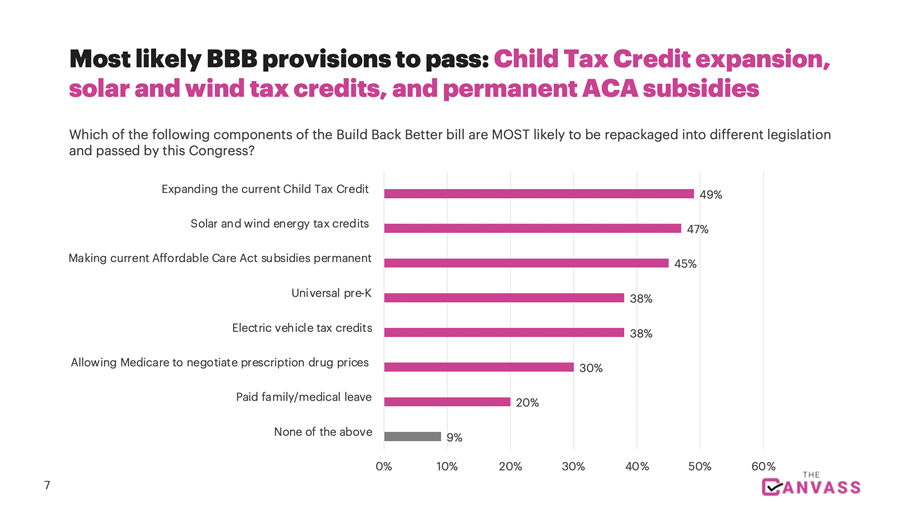Leading up to tonight’s State of the Union address, advocates of the stalled Build Back Better Act appear to be spinning their wheels again. Instead of listening to their detractors and making the necessary changes, they rely instead on the idea that if only they improve their messaging a little bit, the whole plan could still come together.
Last week, they blamed the press for describing the bill, accurately, as a package of social spending provisions. According to POLITICO:
As the Biden administration looks over the cadaver that is their Build Back Better agenda, wondering what components, if any, it can resuscitate, one particular question vexes administration officials. Could they have ended up in a better place had the framing around the legislation been any different?
The answer, among Democrats, is “likely, no.” In light of failure to pass far-reaching legislation, it’s always convenient to blame communications missteps when other political factors did the trick. That said, inside the White House there is a sense that their push was hurt — materially so — by the media’s description of Build Back Better as a “social spending” bill and not an economic one.
…“The president’s economic growth agenda has always been about rebuilding our infrastructure, our manufacturing and our workforce here at home across the board,” said a senior White House official. “The collective decision of the media to describe this as ‘massive social spending,’ or ‘social welfare,’ reflects the exact problems that have held our economy back for so long…”
This week, their goal is to reframe the BBB as a plan that will reduce both costs for families and the deficit. According to CQ Roll Call, President Biden will use his State of the Union address to deploy a new messaging strategy:
[Biden will focus] on how the budget measure can lower costs for families and reduce the deficit. The messaging shift seems designed to appeal to a Democratic senator holding up the budget reconciliation package, West Virginia’s Joe Manchin III, as well as a broader electorate worried about inflation driving up the cost of living.
“The president will call on Congress to send him legislation that reduces the cost of everyday expenses that working families face and reduces the deficit by rewarding work, not wealth,” a senior administration official told reporters Monday on a call previewing the economic portions of Biden’s address. “He will lay out specific practical measures that would reduce costs for families right now, including prescription drug costs and health care premiums, child care costs and energy costs,” an official added. “He will also point to the other ideas he has proposed on areas ranging from housing to care for seniors and people with disabilities to higher education affordability to direct tax relief for families.”
See, it’s an economic plan that’s anti-inflationary and fiscally responsible. Now let’s vote.
But the package that passed the House last year was neither. As we noted in an earlier post, it would likely drive up prices for everybody save those families receiving the direct subsidies, and its impact on the deficit was all but certain to make it bigger, as Senator Manchin pointed out repeatedly.
What changes will Biden offer up to address those concerns? If history is any guide, thfiere won’t be any. What we can expect tonight is not a shift in policy, but merely a little repackaging, much like when Facebook became Meta, or when the White House began calling every new spending program “infrastructure.” More from Roll Call:
But their emphasis on lowering costs for families and reducing the deficit drive at Manchin’s primary concerns, which is that Democrats shouldn’t approve trillions of dollars in new spending while inflation remains high, and that the party needs to focus more on fiscal responsibility.
…The aides didn’t say whether Biden would call for a specific deficit reduction target, but they noted their belief that the budget reconciliation package would reduce the deficit. The measure is largely paid for through tax increases on corporations and wealthy individuals, prescription drug cost savings and enhanced tax enforcement.
All of which suggests that they are still not listening to Manchin or the voters, and is yet another reason we continue to doubt the BBB, or any significant part of it, can be salvaged this year.
We are not alone. According to a new survey conducted by Punchbowl News, 84 percent of senior Democratic Hill aides believe the House-passed BBB is dead, with an even greater share stating that Democrats should pass “whatever they can” – i.e., breaking the bill up into smaller “chunks” – before the midterms.
But if the multi-trillion-dollar tax and spending package is off the table, that doesn’t mean Congress won’t take up changes to the tax code at some point this year. The Punchbowl survey asked Democratic aides which policies they think might move forward; notably, nearly all of the top contenders are squarely in the tax policy space:
Meanwhile, Republicans are eager to address this year’s tighter 163(J) caps on interest deductions, as well as the poorly constructed 461(l) caps on pass-through losses.
Finally, there’s bipartisan support for some temporary provisions, or extenders, which cover everything from accelerated depreciation of racehorses to rum excise taxes.
There’s lots of tax policy in the wings.
So while the White House sees Biden’s speech tonight as an opportunity for yet another communications overhaul, they might succeed instead on signaling to Congress that it is time to pivot from the BBB towards a possible bipartisan package of tax polies that have lots of support and could actually pass Congress this year. We will know more later tonight.

